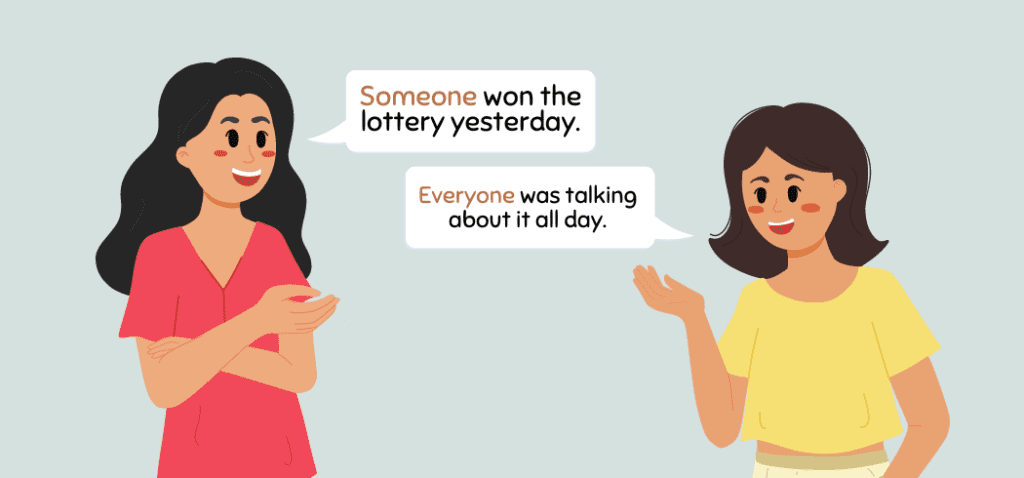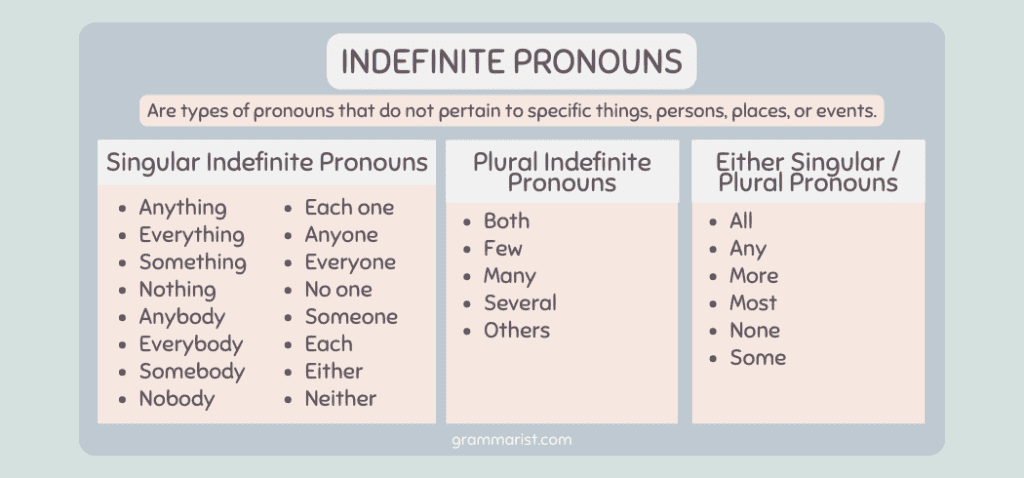There are many types of pronouns in the English language. However, indefinite pronouns seem to be the most unique, if you ask me.
What is an indefinite pronoun? How do you properly use them? My guide will answer everything you need to know about indefinite pronouns. Then, you can test your knowledge by answering the worksheet provided.
What is an Indefinite Pronoun?

You already know that pronouns take the place of a noun or noun phrase. Nouns are names of persons, places, things, and ideas. This part of speech can act as subjects or objects in sentences.
Indefinite pronouns are types of pronouns that do not pertain to specific things, persons, places, or events. Consider the sentence below.
- Somebody wrote on the wall. (An unknown person wrote on the wall).
We know that a person wrote on the wall. However, there is no additional information about them, meaning an unidentified person wrote on the wall. Unlike personal pronouns like he, she, it, and they, indefinite pronouns vaguely refer to any person or object.
Other types of pronouns include personal pronouns, interrogative pronouns, possessive pronouns, reflexive pronouns, demonstrative pronouns, relative pronouns, and more.
How to Use Indefinite Pronouns
Indefinite pronouns are part of the guilty party for creating wishy-washy sentences like someone visited me or I have some cash. But how do you properly use them?
Reciprocal Pronouns
Some indefinite pronouns can be combined to create reciprocity. This type of pronoun is called reciprocal pronouns. Two examples are each other and one another. For example:
- We should help one another achieve our goals.
Prepositional Phrases
You’ll find indefinite pronouns in prepositional phrases used as subjects. Below, each is the sentence’s subject instead of fruits.
- Each of the fruits was sliced by the chef.
Always examine the prepositional phrase following a variable pronoun. Doing so helps you identify which type of verb tense to use. For example:
- Most of the bricks come from the hardware store.
Possessive Indefinite Pronouns
You can add an apostrophe and s to an indefinite pronoun to make it possessive.
- I’m at somebody’s place having coffee.
Affirmative Sentences
Indefinite pronouns with some in affirmative sentences describe an uncertain quantity. Meanwhile, indefinite pronouns with every represent a complete number. Lastly, pronouns with no describe an absence. For example:
- Nobody wants to go out.
- There’s nothing I can do about the situation.
Even if you use indefinite pronouns with no, it is not a negative sentence. That’s because it does not have the word not.
Negative Questions/Sentences
Only negative sentences with any can be in negative sentences. For example:
- I don’t have anyone to call.
But you can turn this into an affirmative sentence.
- I have no one to call.
Indefinite pronouns that include some, any, and every can be used for negative questions that can be answered with yes or no. Some imply actual questions, while others are rhetorical questions. For example:
- Is there anything to see?
- Haven’t you checked everywhere?
Examples of Indefinite Pronouns

Like collective nouns, indefinite pronouns can be singular or plural.
Singular Indefinite Pronouns
Here’s a list of indefinite pronouns in the singular form.
- Anything.
- Everything.
- Something.
- Nothing.
- Anybody.
- Everybody.
- Somebody.
- Nobody.
- Each one.
- Anyone.
- Everyone.
- No one.
- Someone.
- Each.
- Either.
- Neither.
Most of these indefinite pronouns are also compound pronouns. For instance, somebody is a mixture of some and body. Anything is a combination of any and thing.
Even pronouns like everyone is singular because they represent one thing or group. These pronouns are also called collective pronouns.
Remember to use a singular verb with the following pronouns. Using singular verbs with a singular noun and pronoun helps show subject-verb agreement.
Here are singular indefinite pronouns examples in sentences.
- Everyone was at the birthday party. (Everyone is a singular subject and was is a singular verb).
- Someone opens the gate every morning. (Someone is a singular subject and opens is a singular verb).
Plural Indefinite Pronouns
Here are some plural indefinite pronoun examples
- Both.
- Few.
- Many.
- Several.
- Others.
A disagreement between singular pronouns with pronouns in the predicate is a common error in English. Use a plural verb and predicate with your plural indefinite pronouns.
The use of none as a singular or plural indefinite pronoun is debatable. Some think that it is singular when talking about countable nouns. However, there is little to no evidence to support this grammatical rule.
Either Singular / Plural Pronouns
The following indefinite pronouns use either singular or plural verbs.
- All.
- Any.
- More.
- Most.
- None.
- Some.
The Difference Between Indefinite Pronouns and Indefinite Adjectives
It helps to go back to the meaning of pronouns and adjectives to understand the difference between indefinite pronouns and indefinite adjectives.
Adjectives describe nouns and pronouns. Therefore, indefinite adjectives should come before nouns to modify them. For example:
- We are having some cheesecake. (Some describes cheesecake).
Pronouns take the place of nouns. Therefore, they may act as subjects or objects in the sentence without modifying anything. For example:
- I want to have some. (Some is a direct object).
Use Indefinite Pronouns Correctly
If you’ve reached this part of my article, you should already know the definition and proper usage of indefinite pronouns. I’ve also shown you sentence examples of these words.
Remember that indefinite pronouns are non-specific words that can be singular, plural, or both singular and plural. If you have any questions about pronouns and other parts of speech, let us know!